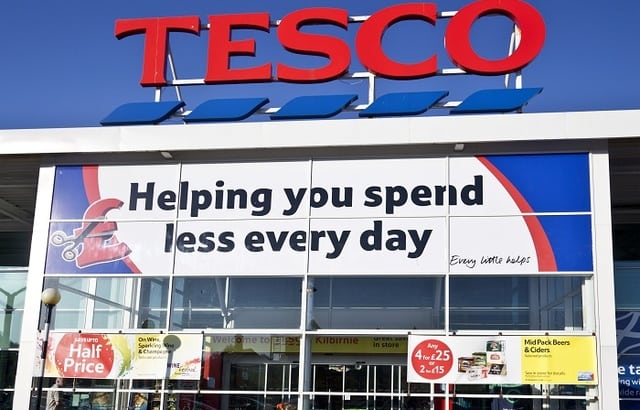Britain’s largest supermarket has agreed to re-instate its interim dividend, after delivering 27% higher group operating profit of £759m over the first six months of the year.
Tesco was forced to scrap its dividend three years ago when an accounting mishap caused it to overstate its profits ahead of its interim results in 2014.
In addition to the triumphant return of its interim dividend, group sales were up 3.3% to £25.2bn, marking Tesco’s seventh consecutive quarter of higher sales.
The firm also managed to whittle its net debt down from £4.35bn to £3.26bn.
Shares in the supermarket chain opened some 2% higher on Wednesday morning, while rivals Sainsburys and Morrisons saw their shares fall roughly 1%.
Tesco turnaround
Though most were already anticipating the dividend announcement, analysts were uniformly positive of the turnaround at Tesco, showing fewer reservations than the previous quarter.
“Every dividend helps,” reflected Laith Khalaf, senior analyst at Hargreaves Lansdown.
“There’s not many things more telling about the health of company than its ability to pay a dividend, and Tesco’s return to the register after a three-year hiatus speaks volumes about the progress the company has made. It’s only a small amount, but this token payment is symbolic in nature.”
Part of the enthusiastic reception was down to the healthy figures across several key headline measures, coupled with the firm’s improving margins, in spite of persistent competition from German discounters like Lidl and Aldi.
Helal Miah, investment research analyst of The Share Centre, explained: “In the past we could have dismissed a sales rise as it would have been helped by food inflation, but the fact that operating and net profits were also up reinforces the idea that the turnaround at the group is gaining traction.
“With increased competition in the sector, many had thought that margins would be compressed for a long time, but this rise suggests that all is not so bad for Tesco and the group is on track to meet the 3.5-4.0% target by 2019/20.”
UK equity managers like Old Mutual Global Investors’ Ed Meier were also cheery on the day, predicting a full recovery for the supermarket.
Meier, who runs the £167.83m Old Mutual UK Equity Income Fund, said: “We have, for a long time, liked the prospects of Tesco’s new strategy under CEO Dave Lewis which he says this morning is “firmly on track” to deliver. These results give confidence in underlying potential for earnings, cashflow and, yes, dividends.”
Risks remain
But, while Tesco’s traditional hurdles of higher inflation and increased competition from discounters proved less problematic over the interim period, “the Booker merger is increasingly looking like a potential banana skin for management,” noted Khalaf.
“The Competition and Markets Authority is due to deliver its findings soon, and the recent plight of Palmer & Harvey, one of Tesco’s key suppliers, will serve to underline the potential knock on effects of the deal. This is also not a takeover which is unanimously backed by shareholders, with a few big investors voicing their opposition to the transaction.”
And its pension deficit “continues to be a thorn in the side,” he added.
“The company’s pension valuation has fallen at an inauspicious time, with low bond yields exacerbating the deficit. If the Bank of England follows through on its recent rhetoric and starts to raise interest rates, Tesco’s pension black hole could collapse, but Tesco won’t see any cash benefit for the next three years.”










